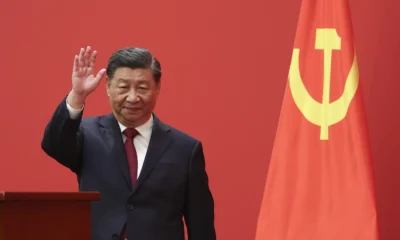[vc_row][vc_column][vc_column_text]The episode sparked speculation about use of sonic devices or weapons
The US has issued an alert to its employees and citizens in China after an official working at its consulate in the southern Chinese city of Guangzhou reported suffering from “abnormal” sounds and pressure leading to a mild brain injury.
US embassy reported this on Wednesday. The Trump administration they are taking these reports seriously and have taken up the matter with Chinese officials.
“A US State Department government employee in China recently reported subtle and vague, but abnormal sensations of sound and pressure,” the US Embassy in China said.
“We do not currently know what caused the reported symptoms and we are not aware of any similar situations in China, either inside or outside of the diplomatic community,” it said.
The embassy, which issued a health alert to Americans living in China, said it could not link the case to health issues suffered by U.S. government staff in Cuba dating back to late 2016.
In Washington, US Secretary of State Mike Pompeo said the United States was concerned about the “serious medical incident” and raised it with China’s visiting State Councillor Wang Yi.
“We notified China of what took place as best we know it and they have responded in a way that is exactly the right response,” Pompeo told a news conference with Wang. “We’re working together to resolve (this) … I hope we can figure it out.”
Earlier, he told Congress that the incident in China was “medically similar” to one suffered by American diplomats in Cuba.
Wang said China has been investigating this matter in a “very responsible” manner. “We haven’t found that any organisation or individual has carried out such a sonic influence. We will stay in communication with the US through diplomatic channels, and we would suggest that US side can also carry out some internal investigation,” he said.
Wang said they do not want to see that “this individual case will be magnified, complicated, or even politicised.”
“We hope people will not associate it with other unnecessary matters. China will, in accordance with the law, protect all the lawful rights and interests of foreigners in China, especially those of diplomats. That’s our firm commitment,” he said.
The unnamed American citizen assigned to the consulate in Guangzhou had reported a variety of “physical symptoms” dating from late 2017 to April this year, the US embassy in Beijing said in an email, reporter news agency Reuters.
The worker was sent to the United States for further evaluation where clinical findings matched mild traumatic brain injury (MTBI), the embassy said.
The State Department was taking the incident very seriously and working to determine the cause and impact, the embassy said. Pompeo said that medical teams were heading to Guangzhou to investigate the incident. The State Department added that the Chinese government told the embassy it was also investigating and taking appropriate measures.
“We cannot at this time connect it with what happened in Havana, but we are investigating all possibilities,” a US embassy official told Reuters.[/vc_column_text][/vc_column][/vc_row][vc_row][vc_column][vc_column_text css=”.vc_custom_1527157739050{border-top-width: 10px !important;border-right-width: 10px !important;border-bottom-width: 10px !important;border-left-width: 10px !important;padding-top: 10px !important;padding-right: 10px !important;padding-bottom: 10px !important;padding-left: 10px !important;background-color: #d1d1d1 !important;border-radius: 10px !important;}”]The incident has sparked talk of a possible sonic attack. Sonic weapons – the use of high-power sound waves to disorient or incapacitate a person, and in extreme cases to cause death – are part of police and military arsenal in some countries, said a report in The Times of India
In some of the relatively benign cases, sonic devices using an ultra high-frequency blasts have been used to dispense loiterers or protesters. But high intensity ultrasound, which can cause serious damage and even death, is not known to have been overtly used, the TOI report said.
In a report investigating allegations of use of such devices after the Cuba episode, Snopes.com ruled out the possibility. It said that a device using ‘infrasonic’ sound waves (sound waves of frequency below the hearing range) would have to be huge and it would not be possible to either conceal it or focus it on a single small target.
On the other hand, in case of a device using ultrasonic sound (beyond the range of hearing), the victim would either have to be submerged in water or have the device in physical contact (both conditions would allow those waves to pass into the body without reflecting off it), reported Snopes.[/vc_column_text][/vc_column][/vc_row][vc_row][vc_column][vc_column_text]In a health alert issued to Americans in China on Wednesday, the US Government warned them about the incident it described as “subtle and vague, but abnormal, sensations of sound and pressure”.
“While in China, if you experience any unusual acute auditory or sensory phenomena accompanied by unusual sounds or piercing noises, do not attempt to locate their source. Instead, move to a location where the sounds are not present,” the emailed alert said.
The US government in October last year expelled 15 Cuban diplomats from the United States for what it said was Cuba’s failure to protect staff at the US embassy in Havana from mysterious health incidents at one point thought to possibly have been acoustic “attacks”.
Staff there reported symptoms including hearing loss, dizziness, fatigue and cognitive issues, though Cuban officials dismissed the idea of acoustic strikes as “science fiction” and accused Washington of slander.
The cause of those incidents remains unresolved.
The Canadian government in April said it would remove families of diplomats posted to Cuba after Canadian personnel there in 2017 also reported similar health symptoms.[/vc_column_text][/vc_column][/vc_row]


 India News23 hours ago
India News23 hours ago
 Cricket news22 hours ago
Cricket news22 hours ago
 India News21 hours ago
India News21 hours ago
 Latest world news9 hours ago
Latest world news9 hours ago
 Latest world news9 hours ago
Latest world news9 hours ago
 Latest world news9 hours ago
Latest world news9 hours ago
 India News9 hours ago
India News9 hours ago
 India News4 mins ago
India News4 mins ago











